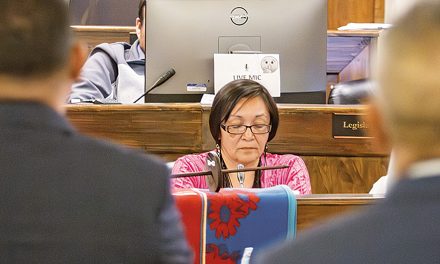
50 Years Ago: Police called, troupe thrown off NCC campus
Less than a year old, the new Navajo Community College is in the midst of its first major controversy after NCC director Bob Roessel threw a traveling theatrical group off the campus for what he viewed as an “obscene” performance.
Not only did he throw them off but he also interrupted a performance in progress and ordered the Navajo Police to escort them off the campus. The action caused so much concern among the student body that the NCC board met in special session and voted to support him in his action.
The Mime Troupe, which has its headquarters in San Francisco, was contracted by the college to perform a series of performances at the Many Farms Boarding School auditorium. The college was holding classes there until its new facilities were completed at Tsaile.
The Navajo Times article didn’t explain in detail what the group did during its performance that made Roessel and other school officials upset, but it apparently consisted of skits that protested America’s involvement in the Vietnam War.
Roessel referred to the performance as “obscene, filthy, un-American and unpatriotic.”
The troupe completed its first performance but Roessel told them that he was cancelling all of the others.
The troupe apparently did not take the cancellation well and scheduled a performance later that night to be held on campus after pointing out that it had been paid for three performances.
But shortly after the night performance began, Roessel showed up with several police officers and stopped the performance.
“We will allow freedom of inquiry until it infringes on anarchy,” said Carl Todacheene, a member of the board of regents. “Freedom of expression can be stretched only so far, but no further.”
Larry Isaac, an ex-Marine and president of the student body, agreed in the shutdown of the program.
“I served this country long and well and I cannot bear to see it ridiculed and belittled,” he said.
He added that he felt the performance violated the Navajo Tribe’s value system and “sense of good taste.”
Speaking of the Vietnam War, the Navajo Times reported that another Navajo had died fighting in the war.
Lance Corp. Juan Jaye Wilson, 22, had died in action on Feb. 14, according to a military press release. His family, including Mr. and Mrs. Jim Wilson, four brothers and six sisters, all lived in Thoreau.
He had graduated from Fort Sill Indian School in Oklahoma and entered the Marine Corps a year later in June of 1968.
In a front-page column, the Navajo Times for the first time editorialized about the dispute between the Navajo Tribal Council and Ted Mitchell, the embattled director of DNA.
Mitchell was recently allowed back on the Navajo Reservation after a federal district court judge ruled that the Council had failed to provide due process in banning him.
But the Times did not comment on the dispute itself, saying this was an internal matter between Mitchell and the tribe. Instead, the paper took exception to comments made by Mitchell critical of the tribal newspaper and reprinted a column that appeared in a recent issue of the Arizona Republic.
Apparently, Mitchell did not look upon the paper with high regard, saying that, in his opinion, it served as a voice for the BIA and then-chairman Raymond Nakai, rather than being a voice for the Navajo people.
He said this despite the fact that the Times had done several stories publishing his remarks against the tribe and printed the entire ruling by the district court in upholding his position.
The editors of the Republic said they had read several issues of the tribal newspaper and felt it had walked a fine line in the middle of the road when it came to reporting the news.
The Republic especially looked with favor on the Times’ editorial page, which contained letters both supportive and negative toward the BIA and Nakai. But the paper added that it could understand how Mitchell and his supporters felt because the newspaper did not show any support for his cause and kept a neutral position on the matter.
“But, in fact, the Navajo Times does an excellent job of representing the various opinions of tribal members,” the Republic stated, adding that the Republic felt that the criticism from Mitchell and his supporters were unfair.
And, in an attempt at humor, Dick Hardwick, editor of the Navajo Times, said he was at a restaurant in Gallup recently.
The restaurant had several waitresses who were Navajo and one who was black, he said.
A group of tourists had come in and started talking to the Navajos about their linage when the black waitress walked by.
Thinking she may be part Navajo, one of the tourists asked if she was a member of a tribe.
“Yes,” she responded. “Blackfeet.”
To read the full article, pick up your copy of the Navajo Times at your nearest newsstand Thursday mornings!
Are you a digital subscriber? Read the most recent three weeks of stories by logging in to your online account.








 Highway 264,
Highway 264, I-40, WB @ Winslow
I-40, WB @ Winslow